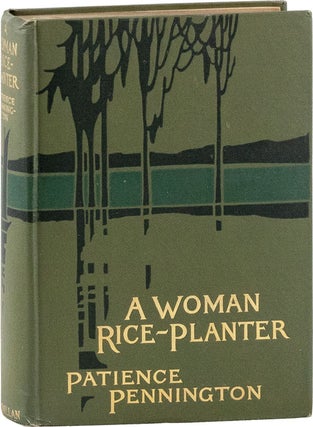![[Item #59271] A Woman Rice Planter. Patience PENNINGTON, Owen Wister, introd., pseud. Elizabeth Allston Pringle.](https://lornebair.cdn.bibliopolis.com/pictures/59271.jpg?auto=webp&v=1663196876)
A Woman Rice Planter
New York: Macmillan, 1913. First Edition. First printing. Octavo (20cm). Green cloth stamped in gilt, green, and black, top edge gilt, in white and green dust jacket; [xiv],450,[6]; 4pp of publisher's ads at rear; relief illustrations by Alice R. H. Smith throughout. Ticket of International Bookfinders, Pacific Palisades, CA, to front pastedown. Embossed stamp of the Hammond Bookstore, Charleston, to t.p. A sound, bright copy, pushed at spine ends, tapped at corners: Near Fine. Jacket with a UK price label at base of spine (8/6 net); reinforced with tape at head of spine, rear lower edge, rear flap fold, and spine verso; chipped at head with loss at tail, with mended tears to spine, rubbed: Very Good.
A handsome copy of this Carolina plantation memoir, in the highly uncommon dust jacket. Pringle was the daughter of Robert Francis Withers Allston, 67th Governor of South Carolina and the owner of immense rice plantations. After the Civil War she married the owner of a neighboring plantation, White House. Eventually, after her husband's death, she acquired and managed White House by herself from 1885, as well as managing Chicora Wood, the last of her own family's plantations, from 1896. "Pringle relied on her land yielding profitable rice crops to pay her mortgages and taxes... With minimal assistance from family and friends," and despite chauvinistic suspicion, "Pringle oversaw both farms, utilized scientific agriculture methods, and decided to plant fruits such as peaches and rent property to hunters to supplement her income. She refused to sell her land" (South Carolina Encyclopedia).
Her farms were generally profitable until about 1900, when poor weather and advanced agricultural technology decreased profits for Carolina rice plantations. At age 58, Pringle turned to writing. From 1904 to 1907, the New York Sun printed entries from her diary under the pseudonym Patience Pennington; in 1913, these were collected in A Woman Rice Planter, which became a bestseller. Her "vignettes... describe plantation life from a sentimental, aristocratic point of view that is often patronizing and racist. She included insightful details about African American folklife, white-black relationships, and racial attitudes. As the book’s narrator, Pringle subtly criticizes contemporary popular opinion that southern women should be passive" (South Carolina Encyclopedia). She died in 1921, and was posthumously inducted into the South Carolina Academy of Authors in 1994. See also JAMES, Notable American Women, vol.III p.100-101.
Price: $1,250.00



